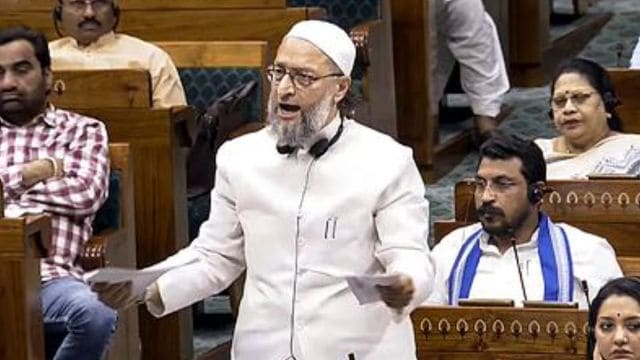‘Arbitrary, discriminatory’: Owaisi, Cong’s Jawed move SC against Waqf Bill
In his plea, Hyderabad MP Owaisi contended that the law is “manifestly arbitrary, perpetuates discrimination on grounds of religion, violates the Shariat Act and strips the Muslim community of the right to manage its own religious institutions”.
 AIMIM President Asaduddin Owaisi during the discussion on the Waqf (Amendment) Bill, 2024, in Lok Sabha. (Sansad TV via PTI Photo)
AIMIM President Asaduddin Owaisi during the discussion on the Waqf (Amendment) Bill, 2024, in Lok Sabha. (Sansad TV via PTI Photo)Two Opposition MPs — AIMIM’s Asaduddin Owaisi and Congress’s Mohammad Jawed — Friday moved the Supreme Court challenging the constitutional validity of the Waqf (Amendment) Act, hours after it cleared Parliament.
In his plea, Hyderabad MP Owaisi contended that the law is “manifestly arbitrary, perpetuates discrimination on grounds of religion, violates the Shariat Act and strips the Muslim community of the right to manage its own religious institutions”.
“The Amendment Act, 2025 marks a departure from this consistent progression towards affording greater protections to the rights of the Muslim community under Articles 25 and 26 of the Constitution and charts a new course of diluting the protections to Waqfs undermining the rights of the minority communities in its properties and expanding the interference of the State over waqf administration,” he said.
“This diminishing of protection given to Waqfs while retaining them for religious and charitable endowments of other religions constitutes hostile discrimination against Muslims and is violative of Articles 14 and 15 of the Constitution, which prohibit discrimination on the grounds of religion,” he said.
Owaisi contended that the law mandating that a person should be a practising Muslim for at least five years to create Waqf is in direct conflict with Sections 3 and 4 of the Muslim Personal Law (Shariat) Application Act, 1937 and “undermines constitutional protections under Articles 14, 15, and 300A of the Constitution, as it discriminates against recent converts by selectively preventing them from seeking religious merit immediately upon conversion by disposing of their property in a manner they deem fit.”
Jawed’s plea too questioned the provision and said it is “unfounded in Islamic law, custom or precedent and infringes upon the Fundamental Right to profess and practice religion under Article 25”.
Stating that ‘Waqf by user’ is a well-established rule of evidence under Islamic jurisprudence, which has also been upheld by the Supreme Court, Owaisi said, “derecognition of this principle would not only jeopardise the status of numerous ancient Waqf properties that rely on this principle to establish their existence but also run contrary to established legal precedent…”
Owaisi’s plea said that “by allowing the government to nominate a majority of non-Muslim members, these amendments effectively strip the Muslim community of its right to manage its own religious institutions, in direct violation of the test laid down in Shirur Mutt (case) and Article 26 of the Constitution”.
Kishanganj MP Jawed contended that “while Hindu and Sikh religious trusts continue to enjoy a degree of self-regulation, the amendments… disproportionately increases state intervention in Waqf affairs.”
“Such differential treatment amounts to a violation of Article 14 in addition to introduction of arbitrary classifications that lack a reasonable nexus to the objectives sought to be achieved, making it impermissible under the doctrine of manifest arbitrariness,” he said.
Reiterating that the Waqf by user principle has been recognised by several long-standing judicial decisions, including the Ayodhya verdict, Jawed said that “by removing this provision, the Act disregards established legal principles and limits the ability of the Waqf Tribunal to recognise properties as Waqf based on historical usage, thereby violating Article 26, which guarantees religious denominations the right to manage their own affairs”.
Stating that the “amendments undermine property rights protected under Article 300A,” Jawed said, “by expanding State control over Waqf assets, limiting the ability of individuals to dedicate property for religious purposes, and subjecting Waqf properties to heightened scrutiny, the Act goes against this Hon’ble Court’s decision in Ratilal Panachand Gandhi v. The State of Bombay… wherein it was held that transferring control of religious property to secular authorities is an infringement of religious and property rights.”







